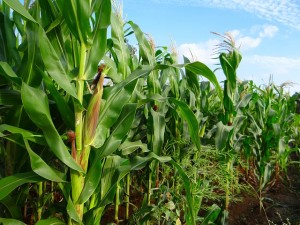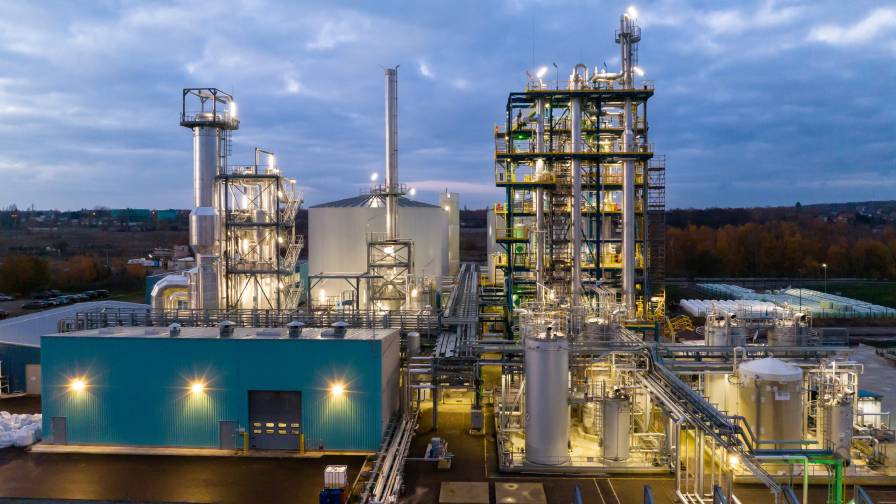How Monsanto India’s Public-Private Partnership Is Improving Corn Farmers’ Lives

On average, maize farmers, using hybrid seeds, have reported average incremental yields of 4-6 quintals (16-24 bushels) per acre of land. This translates into increased income of Rs. 5,000-Rs. 7,000 ($80-$112) per acre.
A public-private partnership between the Indian government and Monsanto India is boosting productivity and farm incomes through increasing adoption of high-yielding corn seeds and farmer education programs.
“In India, our mission is to partner the nation and its farmers in their quest towards prosperity and progress,” Monsanto India says. “Given the huge challenge that the world faces in feeding a growing population of 9 billion people, and recognizing that increasing agricultural yields sustainably can help surmount the challenge, Monsanto has been participating in such initiatives and partnering the government and other like-minded organizations.”
Started in 2011, the Uttar Pradesh (UP) government’s Hybrid Maize Enhancement Program aims to improve crop yields and incomes of maize farmers from 26 districts across UP. With an objective to improve economic self-sufficiency and quality of life of corn farmers in UP, the public-private partnership was envisioned to enable local farmers gain access to quality inputs and use them appropriately. Monsanto is one of six leading seed companies invited to provide high-yielding hybrid maize seeds at a subsidized rate to farmers. Over the past four years, farmers have been able to increase yield and generate higher marketable produce by choosing to plant the high-yielding hybrid maize seeds.
As part of the program, Monsanto offers three high-yielding maize hybrids to smallholder farmers from its top corn brand, Dekalb: Dekalb Double, Dekalb 900M Gold and Dekalb 7074. For the benefit of progressive farmers and farming groups, Monsanto conducted live crop demonstrations, shared information at state-exhibitions and village-level exhibitions and fairs with a sharp focus to help the farmers develop the necessary skills to manage the crops. The project has benefited hundreds of thousands of farmers across the state with the latest agronomic practices and knowledge on crop inputs and practices through farmer education programs, Monsanto India says.
Monsanto participates in similar public-private partnership projects as part of its commitment to lead innovation, build partnerships and encourage choices. “We believe, choices enable farmers to access cutting-edge seeds and agronomic practices in the brand and channel of their choice towards improved yields and livelihoods,” the company told FCI. “Farmer needs and consumer demand present several public-private partnership opportunities for Monsanto to participate across the states of Uttar Pradesh, Jammu and Kashmir, Maharashtra, Odisha, Jharkhand, Gujarat, Rajasthan and Madhya Pradesh.”
FCI: What were the driving factors behind creating this program and what results has it had thus far?
On average, maize farmers, using hybrid seeds, have reported average incremental yields of 4-6 quintals (16-24 bushels) per acre of land. This additional produce translates into increased income of Rs. 5,000-Rs. 7,000 ($80-$112) per acre. The government was enthused with the economic advantages of the crop. Additionally, maize is a water-efficient crop and cultivation of maize has a positive impact on the environment.
Over the past four years, this partnership initiative has successfully impacted the lives of over 300,000 farmers across 26 key districts in the state. More than 170,000 farmers across 17 districts have experienced the benefits in 2014 alone.
FCI: Can you comment on how the program is helping improve food security in India?
Food security is a major challenge for India and needs to be addressed by increasing farm production to meet the food, feed and fiber needs of a growing nation. Several forecasts indicate domestic food, feed and fiber needs will double between 2020 and 2030, on the back of rising incomes, fueled by a rapidly growing GDP. Patterns of food consumption are evolving with an increasing proportion seeking proteins, fruits and vegetables.
India is the fifth-largest maize producer in the world contributing about 2% of the global production. Maize is the third-most important food crop among the cereals, and contributes nearly 9% in the national food basket. Maize addresses key nutrition and protein requirements and given the changing food consumption patterns, demand for maize is driven primarily by the feed and poultry sector in India.
Programs like the public-private partnership seek to provide agriculture inputs to smallholding and marginal farmers at affordable rates, and help improve crop yields and increase incomes. While such programs provide farmers access to quality inputs like hybrid seeds, it also offers them additional benefits in the form of package of agronomic practices and knowledge on crop inputs and practices through farmer education programs. Using knowledge thus gained, farmers can get the best outputs possible and benefit from increased incomes. Serving the farmer on his farm presents the biggest opportunity to improve lives and increase agricultural output of Indian farms, and to feed and clothe the nation. The use of the latest seeds, technologies, knowledge, practices, and market access must therefore be encouraged.
FCI: What other insights can you share about the impact of public-private partnerships in the country?
Public-private partnership programs have helped many small farmers experience the positive economic impact that higher yields bring in because of hybridization. This helps in improving farm yields and incomes through better inputs and agronomic practices thus helping marginal farmers sustainably transition from subsistence farming with open pollinated varietal seeds with low and unpredictable yields, to farming with higher-yielding hybrid seeds and benefit economically with more and better quality produce.
There are instances when farmers choose hybrid corn seeds yet continue with the traditional agronomic practices. The benefits are still visible and it will take sustained efforts over a period of time to help farmers adopt new age practices. The government’s efforts in the past few years have seen farmer adoption of hybrid seeds grow by nearly 30% in the last decade and maize has nearly 55% hybridization levels at present and we are committed to partner with the government to help improve Indian agriculture and benefit the Indian farmers. The concept of public-private partnership remains relevant even today, and has continued to address primary grower concerns across India.






